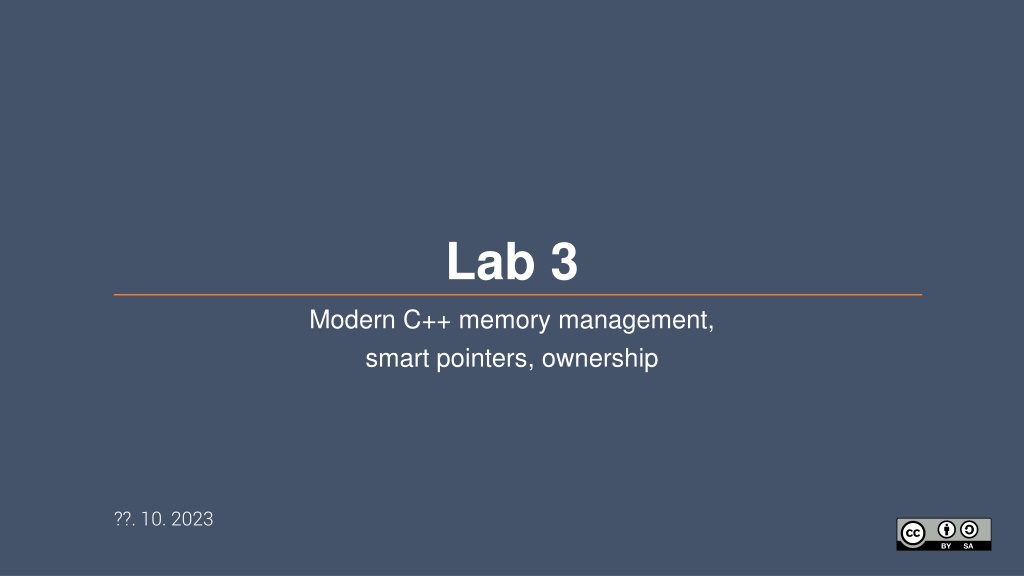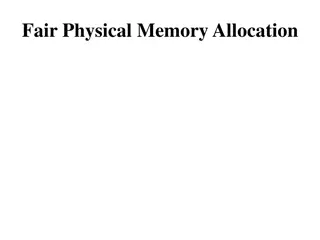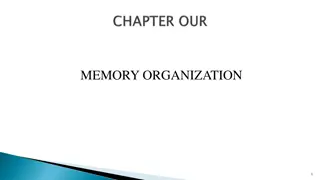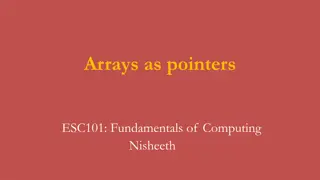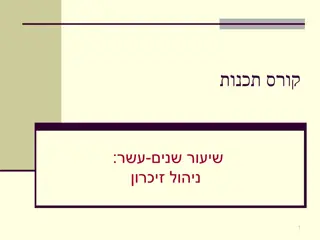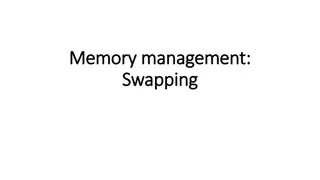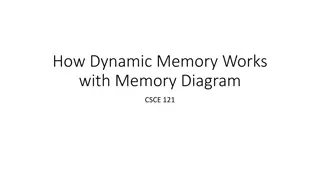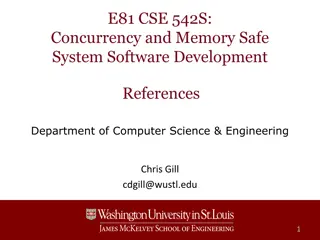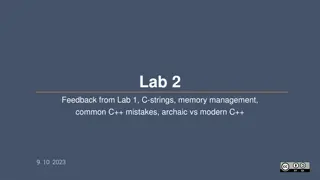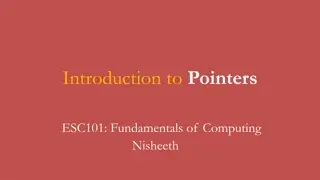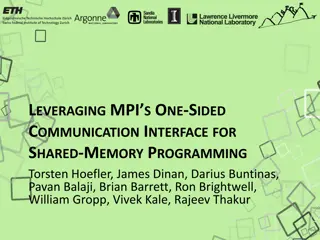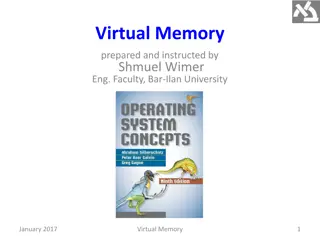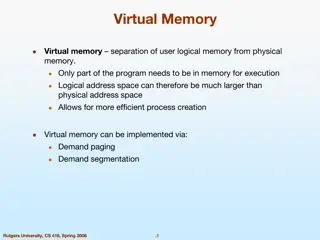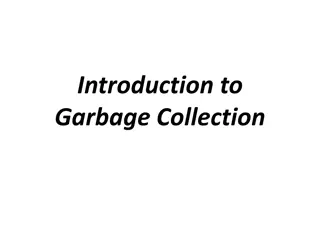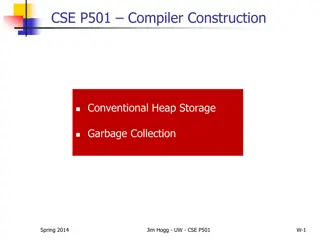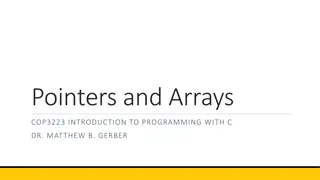Understanding Modern C++ Memory Management and Smart Pointers in Programming Labs
Explore the nuances of memory management in Modern C++ through labs that delve into smart pointers, ownership concepts, and detecting memory leaks using tools like Valgrind. Learn about the importance of using smart pointers to mitigate memory leaks and improve code reliability. Discover the pitfalls of manual memory management and how to address them effectively in your C++ programming projects.
Download Presentation

Please find below an Image/Link to download the presentation.
The content on the website is provided AS IS for your information and personal use only. It may not be sold, licensed, or shared on other websites without obtaining consent from the author. Download presentation by click this link. If you encounter any issues during the download, it is possible that the publisher has removed the file from their server.
E N D
Presentation Transcript
Lab 3 Modern C++ memory management, smart pointers, ownership ??. 10. 2023
Lab 2 : new[] vs new & delete vs delete[] There are two variants of new/delete that are not interchangeable using delete[] on pointer allocated with (single object) new is UB using delete on pointer allocated with (array of objects) new[] is UB With smart pointers, you (mostly) don't need to care Also, the default new/new[] may throw std::bad_alloc There is a non-throwing variant, that just returns nullptr int* ptr = new(std::nothrow) int[1000000000000]; Further reading https://en.cppreference.com/w/cpp/memory/new/operator_new https://en.cppreference.com/w/cpp/memory/new/operator_delete 2023/2024 2 Programming in C++ (labs)
Lab 2 : Memory leaks! When doing manual memory management, it is difficult to not have memory leaks. (Partial) solution is to use smart pointers. Even then we can have memory leaks How to detect those? Instrumentations tools for dynamic analysis Valgrind (https://valgrind.org/) - Linux & Mac e.g. Deleaker (https://www.deleaker.com/) - Windows Instrumentation decreases the program's performance significantly! But will tell you serious problems with your code. On Windows? No problem! -> WSL2! demo WSL Further reading https://learn.microsoft.com/en-us/windows/wsl/install 2023/2024 3 Programming in C++ (labs)
$ apt update $ apt install valgrind Compile with debug symbols and program database Lab 2 : Memory leaks: Demo on Debian/Ubuntu $ g++-12 -g -o lab_02 -std=c++20 ./lab_02.cpp Install from your distribution's package manager $ valgrind ./lab_02 < ./tests/t1.in ... ==1683== Mismatched free() / delete / delete [] ==1683== at 0x484399B: operator delete(void*, unsigned long) (vg_replace_malloc.c:935) ==1683== by 0x109D0F: main (03.cpp:247) ==1683== Address 0x4daa380 is 0 bytes inside a block of size 3 alloc'd ==1683== at 0x484220F: operator new[](unsigned long) (vg_replace_malloc.c:640) ==1683== by 0x109B9B: construct_node(char const*) (03.cpp:204) ==1683== by 0x109C16: main (03.cpp:230) ==1683== ... ==1683== ==1683== HEAP SUMMARY: ==1683== in use at exit: 119 bytes in 8 blocks ==1683== total heap usage: 33 allocs, 25 frees, 79,319 bytes allocated ==1683== ==1683== LEAK SUMMARY: ==1683== definitely lost: 24 bytes in 1 blocks ==1683== indirectly lost: 95 bytes in 7 blocks ==1683== possibly lost: 0 bytes in 0 blocks ==1683== still reachable: 0 bytes in 0 blocks ==1683== suppressed: 0 bytes in 0 blocks ==1683== Rerun with --leak-check=full to see details of leaked memory ==1683== ==1683== For lists of detected and suppressed errors, rerun with: -s ==1683== ERROR SUMMARY: 2 errors from 1 contexts (suppressed: 0 from 0) demo So you can see lines in your source files 2023/2024 4 Programming in C++ (labs)
Lab 2 : Memory leaks: Demo on Debian/Ubuntu Calmly fix the bugs! $ apt update $ apt install valgrind $ g++-12 -g -o lab_02 -std=c++20 ./lab_02.cpp $ valgrind ./lab_02 < ./tests/t1.in ... ==1691== ==1691== HEAP SUMMARY: ==1691== in use at exit: 119 bytes in 8 blocks ==1691== total heap usage: 33 allocs, 25 frees, 79,319 bytes allocated ==1691== ==1691== LEAK SUMMARY: ==1691== definitely lost: 24 bytes in 1 blocks ==1691== indirectly lost: 95 bytes in 7 blocks ==1691== possibly lost: 0 bytes in 0 blocks ==1691== still reachable: 0 bytes in 0 blocks ==1691== suppressed: 0 bytes in 0 blocks ==1691== Rerun with --leak-check=full to see details of leaked memory ==1691== ==1691== For lists of detected and suppressed errors, rerun with: -s ==1691== ERROR SUMMARY: 0 errors from 0 contexts (suppressed: 0 from 0) 2023/2024 5 Programming in C++ (labs)
Lab 2 : The reality of serious development Usually, for serious development, we employ many tools to make sure that our code is as good as possible. People make mistakes! The bare minimum any serious C++ project should use: Use a code formatter (e.g. clang-format) to keep your code consistent and nicely formatted Use static linter with good rules (e.g. clang-tidy with configuration for CppCoreGuidelines) Use instrumentation for dynamic stuff (e.g. Valgrind, CPU/memory profiling) This operates in runtime on concrete input 2023/2024 6 Programming in C++ (labs)
Lab 2 : Other things Good: Implementation with class, constructors and destructors Usage of exceptions Replacing recursion with loops !Good: Test your code with more than just example input/outputs. Dereferencing pointer after delete Not deleting the value itself (it is an allocated array of chars too) When swapping two variables, use std::swap Reuse code if possible 2023/2024 7 Programming in C++ (labs)
Motivation What is wrong with this code? Assume that the bug is not in the functions that are called but in this code snippet. void science(double* data, int N) { double* temp = new double[N*2]; do_setup(data, temp, N); if (not needed(data, temp, N)) return; If we return, memory is leaked! calculate(data, temp, N); delete[] temp; } https://github.com/CppCon/CppCon2022/blob/main/Presentations/Olsen-Smart-Pointers-CppCon22.pdf 2023/2024 8 Programming in C++ (labs)
Motivation What is wrong with this code? Assume that the bug is not in the functions that are called but in this code snippet. void science(double* x, int N) { double* y = new double[N]; double* z = new double[N]; If this throws, memory behind y is leaked! calculate(x, y, z, N); delete[] z; delete[] y; } This is about exception safety. We'll get to that in the future https://github.com/CppCon/CppCon2022/blob/main/Presentations/Olsen-Smart-Pointers-CppCon22.pdf 2023/2024 9 Programming in C++ (labs)
Motivation What is (possibly) wrong with this code? Assume that the bug is not in the functions that are called but in this code snippet. float* science(float* x, float* y, int N) { float* z = new float[N]; saxpy(2.5, x, y, z, N); delete[] x; delete[] y; return z; } Are x, y owning? They better should be! https://github.com/CppCon/CppCon2022/blob/main/Presentations/Olsen-Smart-Pointers-CppCon22.pdf 2023/2024 10 Programming in C++ (labs)
Raw pointer It "can do too many things" Single object vs. array Single: allocate with new, free with delete Array: allocate with new[], free with delete[] Single: don t use ++p, --p, or p[n] Array: ++p, --p, and p[n] are fine Owning vs. non-owning Owner must free the memory when done Non-owner must never free the memory Nullable vs. non-nullable Some pointers can never be null It would be nice if the type system helped enforce that (it doesn't) Raw pointer T* can be all of this or an arbitrary combination of these! By looking at the function, how do we know? 2023/2024 11 Programming in C++ (labs)
Smart pointers The term "smart" can mean that it deviates from raw pointers somehow. Typically limits the behaviour of a pointer to one well-defined role. E.g. owning a pointer that is responsible for deallocation. Behaves like a pointer Points to an object Can be dereferenced The most useful smart pointer types in C++ standard library: unique_ptr<T> shared_ptr<T> If possible, use unique_ptr over shared_ptr. 2023/2024 12 Programming in C++ (labs)
So, goodbye raw pointers? Don't get too excited! In real life, you will encounter tons of legacy code and deal with libs written in C! Don't give up and try to get rid of those old constructs ASAP in your code. Not quite! Use raw pointers as observer pointers to single objects Non-owning pointer, not responsible for deallocation Must be used only within the lifetime of the object it observes There is no way to determine that in runtime! 2023/2024 13 Programming in C++ (labs)
Ownership Ownership specifies which entity/entities are responsible for deallocating a dynamically allocated object/array of objects. With raw pointers there is no construct in C++ to help with that It relies on programmers to know who and when should deallocate There can be also shared ownership then we have multiple owners at a time 2023/2024 14 Programming in C++ (labs)
Changing the owner We need to change owners from time to time. With raw pointers it is not apparent. int* ptr1 = new int(5); int* ptr2 = ptr1; // Who is the owner? unique_ptr<int> ptr1 = make_unique<int>(5); unique_ptr<int> ptr2 = move(ptr1); // Ownership transferred With unique_ptr, the compiler is helping you! It won't allow you to touch the 5 via ptr1 after ownership is passed to ptr2. shared_ptr counts owners Deallocates when 0 owners Are the local x, y the owners now? float* science(float* x, float* y, int N) { float* z = new float[N]; saxpy(2.5, x, y, z, N); delete[] x; delete[] y; return z; } 2023/2024 15 Programming in C++ (labs)
std::unique_ptr<T> #include <memory> since C++11 A smart pointer that owns the memory it points to and will deallocate it once it is destructed. Assumes (not guarantees) only one owner at a time (thus "unique"). Cannot be copied no copy variants: operator=(const T&) nor T(const T&) Can be moved there are move variants: operator=(T&&) nor T(T&&) No implicit conversion unique_ptr<T> -> T* No implicit conversion T* -> unique_ptr<T> 2023/2024 16 Programming in C++ (labs)
std::unique_ptr<T> to single object #include <memory> Constructors (empty or taking ownership of the raw pointer) // Default ctor auto ptr1 = unique_ptr<int>(); // Nullptr // Ctor from raw pointer auto ptr2 = unique_ptr<int>( new int(5) ); Modifiers // Extracts the ownership to raw pointer again int* praw = ptr2.release(); // No deallocation // operator* // operator-> ptr2->method_on_t() (*ptr2).mehod_on_t() // Deallocates the previous // and owns the new memory ptr2.reset(new int(7) ); Mind the ., not ->. Methods of unique_ptr. Observers // Get observer ptr int* p_obs = ptr2.get(); // operator bool() if (ptr2) { ... } // If not nullptr Mind ->/* Method on pointed-to object. Further reading demo https://en.cppreference.com/w/cpp/memory/unique_ptr 2023/2024 17 Programming in C++ (labs)
unique_ptr<T> vs make_unique<T> Calling ctor of unique_ptr only nullptr or taking ownership of a raw pointer Calling make_unique<T> does three things: 1. Allocates the space 2. Constructs the instance of T at the allocated space (placement new) 3. Constructs the unique_ptr<T> from this pointer using T = pair<bool, char>; auto x = make_unique<T>(true, 'x') // OK // (1) T* p = malloc(sizeof(T)); // (2) new (p) T(true, 'x'); // (3) return unique_ptr<T>(p); auto x = unique_ptr<T>(true, 'x') // ERROR: no such ctor 2023/2024 18 Programming in C++ (labs)
std::unique_ptr<T[]> to array of objects #include <memory> Partial template specialization for T[] Different function body if T is of type array No */-> operators, but offers operator[] Construct by calling helper function with T[] type Parameter is the number of elements, not any value using Pair = pair<bool, char>; auto x = make_unique<Pair[]>(10); // operator[] available cout << x[1].first << endl; 2023/2024 19 Programming in C++ (labs)
STD containers as "smart array pointers" You can use some STD containers for safe allocation/deallocation. std::vector, std::string These have copy constructors and assignment operators defined! No enforcement of only one copy of data existing Data can be reallocated to different memory locations Use std::span or std::string_view as obsrvers. using Pair = pair<bool, char>; // Allocate & initialize vector<Pair> xs(10, make_pair(false, '-')); Copy operators/ctors of the containers are not deleted by default. // operator[] cout << xs[2].first << endl; // The first two elements auto s1 = span(xs.begin(), 2); // The last 3 elements auto s2 = span(xs.end() - 3, xs.end()); 2023/2024 20 Programming in C++ (labs)
std::unique_ptr: Transferring ownership There should be only one owner of the allocated memory at the time! unique_ptr helps, but only if not used incorrectly ptr_raw must be owning (but the programmer is the one who must guarantee that) int* ptr_raw = new int; auto ptr1 = unique_ptr<int>(ptr_raw); // Ownership transferred auto ptr2 = move(ptr1); // Ownership transferred ptr2 is the owner now. After this statement, ptr1 is robbed, points to nullptr and should not be used. 2023/2024 21 Programming in C++ (labs)
std::unique_ptr: Transferring ownership to function Pass the ownership to/from the function float* science(float* x, float* y, int N) { float* z = new float[N]; saxpy(2.5, x, y, z, N); delete[] x; delete[] y; return z; } hopefully these are owning, but who knows hopefully the caller will deallocate it unique_ptrs, but copies! Fixing it with modern C++: unique_ptr<float[]> science(unique_ptr<float[]> x, unique_ptr<float[]> y, int N) { auto z = make_unique<float[]>(N); saxpy(2.5, x.get(), y.get(), z.get(), N); return z; } unique_ptr by value auto a = make_unique<float[]>(2); auto b = make_unique<float[]>(4); science(a, b, 2); // ERROR: copy ctor deleted // So use move ctor science(move(a), move(b), 2); // OK 2023/2024 22 Programming in C++ (labs)
std::unique_ptr: Wait, what about && as arguments? function arguments behave just as local variables Shouldn't there be an rvalue reference on the x,y arguments? unique_ptr<float[]> science(unique_ptr<float[]> x, unique_ptr<float[]> y, int N) { auto z = make_unique<float[]>(N); saxpy(2.5, x.get(), y.get(), z.get(), N); return z; } unique_ptr<float[]> rvscience(unique_ptr<float[]>&& x, unique_ptr<float[]>&& y, int N) { auto z = make_unique<float[]>(N); saxpy(2.5, x.get(), y.get(), z.get(), N); return z; } auto a = make_unique<float[]>(2); auto b = make_unique<float[]>(4); memory of caller's a, b is freed here rvalue refs memory of caller's a, b is NOT freed here compiler finding the right overload and doing implicit argument conversions // copy x = unique_ptr<float[]>(rvalue ref to a); // copy y = unique_ptr<float[]>(rvalue ref to b); science(move(a), move(b), 2); // OK // rvalue ref x = rvalue ref to a; // rvalue ref y = rvalue ref to b; rvscience(move(a), move(b), 2); // OK 2023/2024 23 Programming in C++ (labs)
STD smart pointers work fine with STD containers Feel free to use it with STD containers. vector<unique_ptr<T>> v; v.push_back(make_unique<T>()); unique_ptr<T> a; v.push_back(move(a)); v[0] = make_unique<T>(); auto it = v.begin(); v.erase(it); 2023/2024 24 Programming in C++ (labs)
std::unique_ptr pitfalls: Only from owning pointer! Only construct unique_ptr from a raw pointer that is owning! auto pxs = make_unique<int[]>(3); int* prxs = pys.release(); // prxs is owner now auto pys1 = unique_ptr<int[]>(prxs); // This is fine auto pys2 = unique_ptr<int[]>(prxs); // (!) Double free prxs is not owner here! 2023/2024 25 Programming in C++ (labs)
std::unique_ptr pitfalls: Do not release and construct! Do not use release -> ctor, use move semantics auto xs = make_unique<int[]>(3); unique_ptr<int[]> pxs2(xs.release()); // Don't auto pxs2(move(xs)); // Just move, let STD do the job 2023/2024 26 Programming in C++ (labs)
std::unique_ptr pitfalls: Dangling pointers are still possible with observers Do not use release -> ctor, use move semantics T* p = nullptr; { auto u = make_unique<T>(); p = u.get(); } // p is now dangling and invalid auto bad = *p; // undefined behavior Pointer p dereferenced after the destination memory deallocated 2023/2024 27 Programming in C++ (labs)
std::shared_ptr<T> #include <memory> since C++11 A smart pointer that owns the memory it points to and will deallocate it once all owners are destructed. Allows for multiple owners at a time (thus "shared"). The ownership cannot be extracted as with unique_ptr! Can be copied operator=(const T&) nor T(const T&) each copy increments the reference counter Can be moved there are move variants: operator=(T&&) nor T(T&&) No implicit conversion shared_ptr<T> -> T* No implicit conversion T* -> shared_ptr<T> 2023/2024 28 Programming in C++ (labs)
std::shared_ptr<T>: Concept of implementation #include <memory> (HEAP) (STACK) Each shared_ptr is two pointers Pointer to control block Pointer to manage memory shared_ptr<T> x; Managed memory block ptr to T ptr to CB Reference counter 2023/2024 29 Programming in C++ (labs)
std::shared_ptr<T> for single object #include <memory> Constructors (empty or taking ownership of the raw pointer) // Default ctor auto ptr1 = shared_ptr<int>(); // Nullptr // Ctor from raw pointer auto ptr2 = shared_ptr<int>(new int(5)); // Copy ctor auto ptr3 = ptr1; copy ctor available Modifiers // Deallocates the previous // and owns the new memory ptr2.reset(new int(7) ); // operator* // operator-> ptr2->method_on_t() (*ptr2).mehod_on_t() No ptr.release()! Observers // Get observer ptr int* p_obs = ptr2.get(); // operator bool() if (ptr2) { ... } // If not nullptr Further reading demo https://en.cppreference.com/w/cpp/memory/shared_ptr 2023/2024 30 Programming in C++ (labs)
std::shared_ptr<T[]> for array of objects #include <memory> Partial template specialization for T[] Different function body if T is of type array No */-> operators, but offers operator[] Construct by calling helper function with T[] type Parameter is the number of elements, not any value The manager memory is deallocated when the last owner is destructed. auto x1 = make_shared<Pair[]>(10); auto x2 = x1; auto x3 = move(x1); // Does not increment counter move ctor/asignment available // operator[] available cout << x3[1].first << endl; operator[] available for array shared pointers Further reading https://en.cppreference.com/w/cpp/memory/shared_ptr 2023/2024 31 Programming in C++ (labs)
std::shared_ptr pitfalls: Do copy only shared_ptr instances. Do not construct new shared_ptr from non-owning pointers! auto pxs = make_shared<int[]>(3); auto pys1 = shared_ptr<int[]>(pxs); // This is fine auto pys2 = shared_ptr<int[]>(pxs.get()); // (!) Double free pxs get method returns a raw pointer to the managed memory. The constructor of pys2 instance cannot know that it is managed already by pys1 pxs. 2023/2024 32 Programming in C++ (labs)
std::weak_ptr<T> #include <memory> A non-owning pointer that is able to detect if the target object is still valid Not that useful, but good to know about Before usage, it must be casted (.lock()) to shared_ptr Just remember that something like observer pointer that is able to detect if the memory is valid exists. 2023/2024 33 Programming in C++ (labs)
Memory management in modern C++ Cheat sheet on how to use pointers in modern C++ Owner Non-owning (observer) std::unique_ptr<T>, std::shared_ptr<T>, single object T*, const T* std::unique_ptr<T[]>, std::shared_ptr<T[]>, array of objects std::span dynamic array of objects std::vector<T>, std::string std::span, std::string_view When in doubt, start with unique_ptr, convert to shared_ptr later. unique_ptr is often enough 2023/2024 34 Programming in C++ (labs)
Task 3 : Binary search tree for strings (modern C++) The task is the same! Start with your solution from the previous lab. This time with C++ string and smart pointers. In other words, we will write it like people should write (most) programs in C++ nowadays. Hints: #include <string>, class string, #include <memory>, class unique_ptr 2023/2024 35 Programming in C++ (labs)
Intermezzo: Three-way comparison operator <=> since C++20 Also called the "spaceship operator" You get all three possible outcomes with one operation. < -> std::strong_ordering::less = -> std::strong_ordering::equal or std::strong_ordering::equivalent > -> std:: strong_ordering::greater There can be also std::partial_ordering with unordered state According to documentation, these are the same these are the same According to documentation, Further reading https://en.cppreference.com/w/cpp/language/operator_comparison#Three-way_comparison https://www.modernescpp.com/index.php/c-20-the-three-way-comparison-operator/ 2023/2024 36 Programming in C++ (labs)
Memory leaks with smart pointers? You can use smart pointers badly! See the Pitfalls slides I showed previously Even if you use them well, there can be a leak! unique_ptr head; 1 3 2 Tree is fine with unique_ptr 2023/2024 37 Programming in C++ (labs)
Memory leaks with smart pointers? Even Directed Acyclic Graph is fine Just switch to shared_ptr unique_ptr head; 1 3 2 DAG is fine with shared_ptr 2023/2024 38 Programming in C++ (labs)
Memory leaks with smart pointers? General graph with cycles bad bad You can store owners in some other structure e.g. map, unordered_map, vector, list unique_ptr head; 1 2 3 We're stuck here! Memory is leaked. 2023/2024 39 Programming in C++ (labs)
Lab 3 wrap up You should know how to use smart pointers and basic STD containers to avoid memory leaks and double frees. how to use observer pointers for both single and arrays of objects how to convert legacy code with manual management to smart pointers Next lab: Parameter passing & const, number parsing, exceptions, casts, Your tasks until the next lab: Task 3 (24h before, so I can give feedback). Just a directory lab_03 with one CPP file will do Feel free to deliver the whole project with some build system (CMake, make) 2023/2024 40 Programming in C++ (labs)
